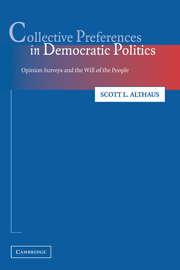Book contents
- Frontmatter
- Contents
- List of Figures and Tables
- Acknowledgments
- 1 Introduction
- PART I ILLUSIONS OF AGGREGATION
- PART II INFORMATION EFFECTS IN COLLECTIVE PREFERENCES
- 4 The Impact of Information Effects
- 5 The Structure and Causes of Information Effects
- 6 The Temporal Dynamics of Information Effects
- PART III OPINION SURVEYS IN DEMOCRATIC POLITICS
- Appendix A Political Knowledge Indices
- Appendix B Methodology
- References
- Index
6 - The Temporal Dynamics of Information Effects
Published online by Cambridge University Press: 06 January 2010
- Frontmatter
- Contents
- List of Figures and Tables
- Acknowledgments
- 1 Introduction
- PART I ILLUSIONS OF AGGREGATION
- PART II INFORMATION EFFECTS IN COLLECTIVE PREFERENCES
- 4 The Impact of Information Effects
- 5 The Structure and Causes of Information Effects
- 6 The Temporal Dynamics of Information Effects
- PART III OPINION SURVEYS IN DEMOCRATIC POLITICS
- Appendix A Political Knowledge Indices
- Appendix B Methodology
- References
- Index
Summary
Referring to information effects as a source of bias in collective opinion implies that the method for simulating fully informed preferences might estimate the opinions a public would indeed come to have if it were more knowledgeable about politics. If information effects are caused primarily by social processes, such as uneven rates of knowledge diffusion among different segments of the mass public, then fully informed opinion might be able to predict what surveyed opinion will look like at a future point in time. Of course, information effects also could be the macro-level manifestation of micro-level psychological factors such as chronic inattentiveness in some segments of the population or stable differences in values and political orientations that are related to knowledge levels. If psychological rather than social processes give rise to information effects, then measures of fully informed opinion should have little predictive power for anticipating changes in surveyed opinion.
Using time series data from the American National Election Studies, this chapter examines how information effects evolve over time. After detailing the ways that social and psychological processes can influence how information diffuses in large populations, the chapter traces changing levels of political knowledge and interest in politics over the 1980–1998 period. The rest of the chapter addresses several questions about how gaps between surveyed and fully informed collective preferences develop over time. Do information effects tend to resolve, remain stable, or grow in size? Once resolved, are information effects likely to reappear?
- Type
- Chapter
- Information
- Collective Preferences in Democratic PoliticsOpinion Surveys and the Will of the People, pp. 196 - 240Publisher: Cambridge University PressPrint publication year: 2003



